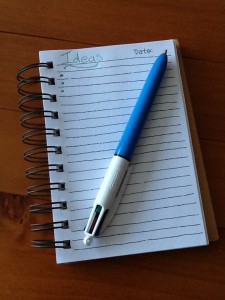 Ideas for writing are everywhere – it’s just a matter of noticing them. You might like to try carrying a notebook with you so you can write down ideas as they come to you. You might not use all of them straight away, but you can always come back to them for inspiration when you’re feeling stuck. Below you’ll find a list of creative writing exercises to inspire ideas for settings, plots, characters and conversations you might be able to use in your stories. You can try doing as many or as few of the exercises as you like.
Ideas for writing are everywhere – it’s just a matter of noticing them. You might like to try carrying a notebook with you so you can write down ideas as they come to you. You might not use all of them straight away, but you can always come back to them for inspiration when you’re feeling stuck. Below you’ll find a list of creative writing exercises to inspire ideas for settings, plots, characters and conversations you might be able to use in your stories. You can try doing as many or as few of the exercises as you like.
Setting
- At your local supermarket, you can find free property flyers full of pictures of houses for sale. Try picking out a house and using the images as a starting point for a story.
- Think of a place you know well. Make a list of details about this place – think about what you hear, smell, see, taste and feel. Start writing a story in this setting incorporating these details into the action.
- If you’re going to a new place, make an effort to take notice of interesting details. These might help you with settings for your stories in the future.
Plot
- Write down 10 professions (teacher, doctor, zoo keeper) and 10 settings (Disneyland, a car wash, a movie theatre). Mix these up in a hat. Pick them out at random and see if the combinations inspire a story.
- Try writing continuously, nonstop, for 10 minutes. Don’t worry about spelling, grammar or even making sense. Just keep your pen moving. When 10 minutes is up, stop and have a look at what you’ve written. You might find some interesting ideas you don’t even remember writing.
- Try reading newspapers and magazines. Real life events might give you ideas for stories.
Dialogue (conversation in stories)
- Writers are good eavesdroppers. When you are out and about, notice the conversations going on around you. Write down anything that gives you a good idea.
- Try playing the Conversation Game with a friend. Pass a piece of paper back and forth between you, each of you writing one half of the conversation. You can write as characters or as yourselves.
- When watching TV, listening to the radio or reading books, take note of any interesting phrases. You may like to use versions of these to add colour to your dialogue.
Character
- In magazines and newspapers, find pictures of people who look interesting. You may like to refer to these when describing characters.
- Before you start work on a new story, you might want to get to know your character better. One way of doing this is by making a list of their likes, dislikes, hobbies, friends, fears, dreams etc.
- Sometimes choosing a name for your character is difficult. Try opening the phonebook at random and pointing somewhere on the page. Choosing an interesting name may give you ideas about what the character is like.
You can find more writing tips, ideas and story starters on our blog page.
